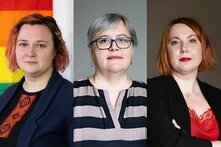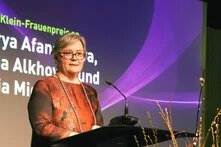Darya Afanasyeva is a Belarusian feminist activist, a blogger, lesbian, and a former political prisoner. To her the term “former” seems odd in this context. As she says, such an experience will stay with you for life.

Her friends call her Dafna – and so may I. Before talking to her, I’ve been scrolling through her Instagram – and by chance I happened across a photo showing the two of us. In Minsk, in 2020, I had designed a banner and taken it to a protest. There Dafna, who liked the friendly feminist statement I carried, took a picture. Later she was arraigned because of her political and feminist activism, and this photo was used as evidence for one of the so-called “episodes.” The charges against her consisted of many such recorded “episodes” – protests, pictures, comments on social media. While we’re talking, I think about how arbitrary it is that she spent two-and-a-half years in prison, and I didn’t – and I’m happy that, for eight months now, Darya’s been free and safe.
Prison is meant to rob you of your dignity
Darya used to be an HR manager in the IT industry but at some point she decided to take a break. Today, she doesn’t represent any organisation or company, just herself. Her educational and awareness endeavours, however, continue – only that now, as an interviewee, Dafna will not only discuss feminism but also her experiences in prison. For this work, she says, she’s prepared herself, and this is exactly why she left Belarus. She never declines to be interviewed, using every opportunity to tell the world about the conditions in Belarus’ prisons and penal camps. “Women,” she stresses, “will not only be robbed of their liberty, but also of their health and their dignity. […] They are not allowed to communicate, may not share with others, nor aid or love one another.”
She’s especially concerned about the issue of domestic violence, as many women have been sentenced as alleged aggressors. Instead of applying rules and regulations that allow for mitigating circumstances (such as “excessive self-defence” or “grievous bodily harm resulting in death”), all these women have been sentenced as murderers – “and that,” she says, “even in cases where the women acted in self-defence – yet this will not be taken into consideration, even if they’ve suffered beatings.”
No friendship, no love
Darya cherishes the memory of her friends in prison – of the political prisoners as well as of those who’ve been branded murderers. She keeps in touch with them via relatives, and she hopes to meet them again, one day, once they’ve been released.
She has always openly campaigned for the rights of the LGBTQ+ community, says Darya, but for a long time she didn’t come out as lesbian – there was no need to do that. In prison she was faced with profound homophobic sentiments, and she realised that she had to come out and could no longer keep her romantic relationships to women hidden. “I had been sentenced to two-and-a-half years in prison,” she says, “while other women were there for 10 or 15 years. It is very hard to live without tenderness, support, friendship, and love – especially when you’re queer.” It is illegal for the women to engage in sexual activities in their cells and, should the wardens learn about it, the penalties are severe.
Sooner or later my blog will be categorised as extremist
At some point, Darya set up a blog, and initially she only wrote about books. She reviewed titles that she came across or that publishers sent her. Then she got more and more into feminism – and not just regarding books. It became a bit of a running gag among her followers to say “Dafna’s still trying to convince us that this is about books – but it’s not and it hasn’t been in a long time.” So Dafna switched and began using a lifestyle kind of format and to write more about her experiences – about things she did for leisure, her neighbourhood, events she went to. Every Friday she posted a Q&A column, and often the questions were private in nature. She’s still unafraid and open – which makes her vulnerable and strong at the same time.
For a period of time, Darya’s page had been deleted to avoid providing prosecutors with more evidence. Later, however, the site was restored, and when this happened, Darya was moved to tears. “It was as if a child that I’d reared for years had come back to me,” she says. “My heart and soul had gone into that blog.”
Darya used to have about 10,000 followers. Now that number has dropped by around a 1,000, due to her activism, she believes. According to Belarus’ law against extremism, all contents criticising the authorities is illegal, meaning that even interacting with it – liking, commenting, sharing, or subscribing – is an indictable offence. Darya had thought that she might lose half of her followers because the political situation had deteriorated so dramatically while she’d been in prison. Also, she’s less active on Instagram these days. “I sometimes used to post a 100 times a day and respond to 150 messages,” she says. “Now I lack the resources to do this. It takes time to recover from prison, physically as well as emotionally.”
Humour as a strategy for survival
“In court I was told that with my rainbow-coloured socks I intended to debauch the nation,” she says. For people unfamiliar with the situation in Belarus such allegations must seem absurd and laughable. Despite the difficult time in prison, which has caused her post-traumatic stress disorder and depression, Darya’s continually joking. Humour is not just inherent to her, it is also an essential quality for coping with troubles that would have made others give up.
Darya tells me that subscribers of her blog will often send her personal messages, including life stories – for example about sexualised violence or walking out on an abusive partner. Darya is compassionate and will take such stories to heart, yet she’ll also note with irony: “Right – Darya, the blogger from Belarus will certainly help you pick up the pieces of your life.” Still, it helps to know about women’s shelters and legal counsel and to be able to recognise the dynamics of violence in relationships.
During her time in prison, Darya and her cell mates would draft lists of all the things they would do once they were released. One of Darya’s bullet points was ‘perform feminist stand-up comedy.’ Yet, right away she adds that she would only do this, if enough “prison girls” were in the audience, because many of her jokes would be lost on the average stand-up audience member. To give an example, she tells me a joke about sweets she hid in her underwear and socks so that the wardens at the prison factory wouldn’t be able to find them. I didn’t get the joke, not even after Darya tried to explain it to me – prison humour, I guess. Such jokes may often be crude and politically incorrect, yet in prison one is unable to make other jokes.
On her new life in Poland
I ask Darya whether I may reveal that she’s in Poland now. Her ironic response: “For the police officer in charge of my case, I’ve taken selfies with the skyscrapers in the background and told him, ‘no need to look for me in Chizhovka any more’.”
Currently, Darya is unable to leave Poland as she’s still waiting to get her international protection status recognised and receive travel papers from the Polish authorities. This has been underway for six months, and Darya is hopeful that she’ll be able to feel safe again soon, to travel, and to share her new adventures with the readers of her blog. Also, she doesn’t rule out the possibility of writing about Polish politics in the near future, especially on the topic of abortion.
Prison will change people
Darya has a partner, Ksenia; they met in Poland and they live together. “So I went to Europe,” she says and laughs, “and I thought I’d meet a European woman … and what did I get – a Belarusian woman who’s also been a jailbird.” Since her time in prison, Darya has trouble focusing; she suffers from memory lapses and her Polish language skills are too limited to have long conversations. Ksenia supports Darya, managing her calendar, making doctor’s appointments, and translating where necessary. This makes me realise how important it is to view prison experiences from both sides – not solely as the experience of the person who’s in prison but also of those who support them by writing letters, sending parcels, or by just waiting for them, and who will later help them to deal with the consequences, as Ksenia does for Darya.
Darya has changed. After being released she thought she’d be visiting some happening clubs right away and celebrate life. This was not to be – not after a month and not now, eight months later. She’s feeling drained. She used to be extroverted, met new people all the time, and liked going to bars. Now she prefers to stay home. Her friends will invite her to go out, but most of the time Darya will not take them up on it. She finds it hard to accept that she’s a different person now. She’s still waiting to become her former self; she’s prepared, however, that this may never happen. Prison will change people.


